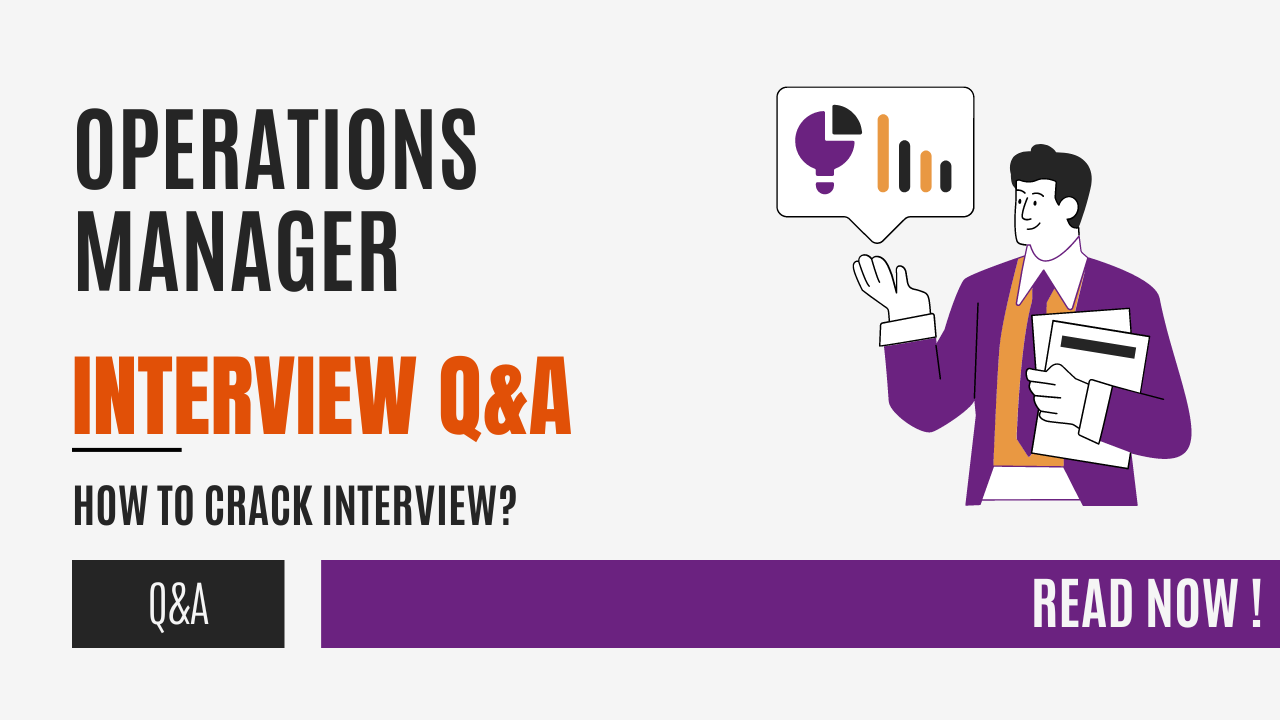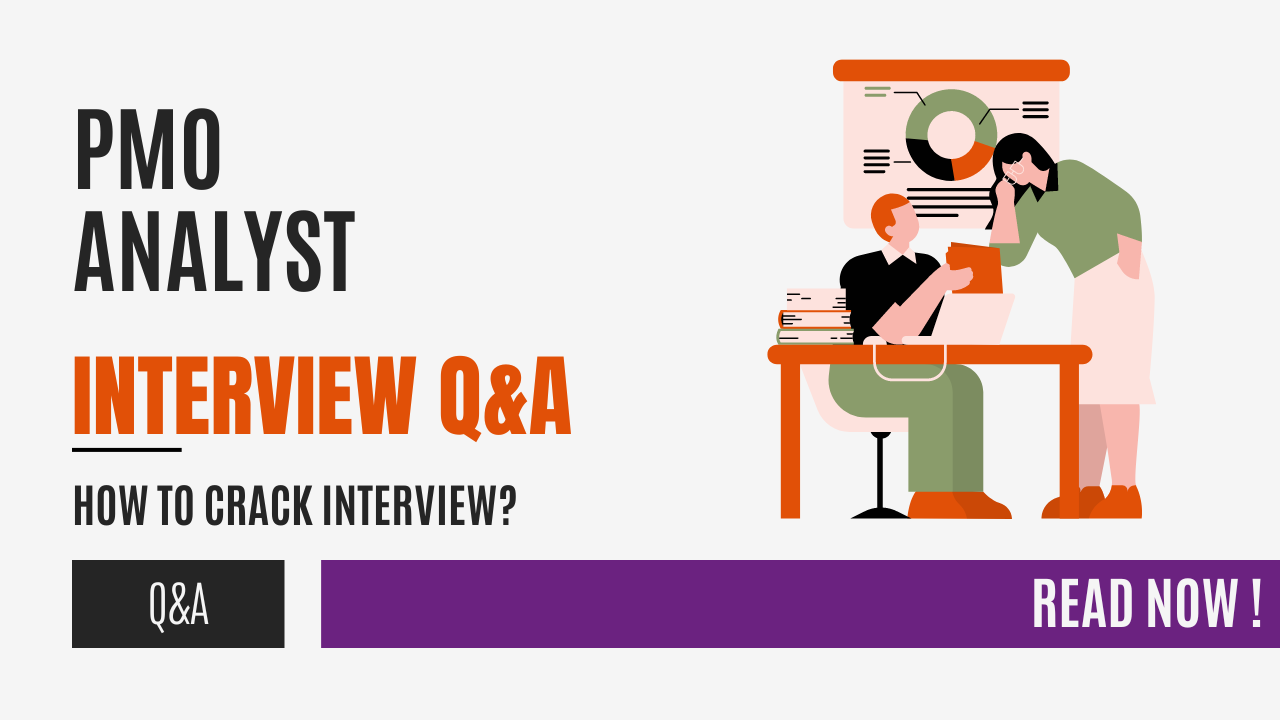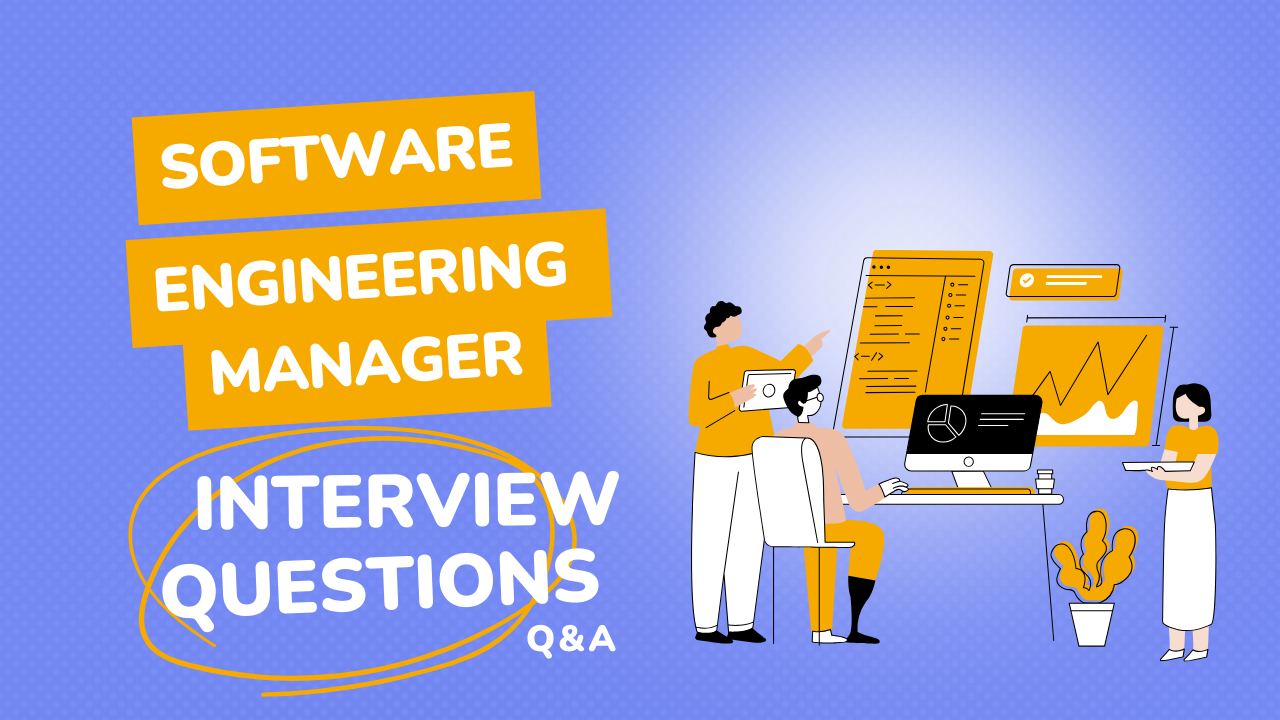Blog Detail

How to Clear Operations Manager Interview in Malaysia
Jul 10, 2024
Securing a position as an Operations Manager in Malaysia can be an enriching career move, offering opportunities for professional growth and development in a dynamic and vibrant business environment. However, landing the role requires thorough preparation and a keen understanding of the expectations and nuances of the interview process. In this guide, we'll explore the key aspects of an operations Manager interview in Malaysia, offering insights and tips to help you shine in this pivotal moment of your career journey.
Understanding the Role
Before delving into the interview process, it's crucial to grasp the responsibilities and expectations associated with the role of an operations Manager. In Malaysia, like in many other countries, an operations Manager plays a pivotal role in ensuring the smooth and efficient functioning of various operational aspects within an organization. This includes overseeing day-to-day operations, optimizing processes, managing resources, and driving productivity and efficiency.
Researching the Company
One of the cardinal rules of interview preparation is conducting thorough research about the company you're interviewing with. In the context of Malaysia, understanding the company's operations, its market presence, industry trends, and cultural dynamics can significantly enhance your preparedness. Be sure to explore the company's website, annual reports, recent news articles, and social media presence to glean valuable insights that you can leverage during the interview.
Emphasizing Cultural Fit
Cultural fit is a crucial consideration for employers in Malaysia, where workplace dynamics are often influenced by cultural nuances and values. During the interview, emphasize your adaptability, respect for diverse perspectives, and your ability to thrive in a multicultural environment. Demonstrating an understanding of Malaysian business etiquette, such as showing deference to hierarchy and maintaining a respectful demeanour, can also make a positive impression on your interviewers.
Highlighting Relevant Experience
As with any job interview, highlighting your relevant experience is paramount. Be prepared to discuss your accomplishments, challenges overcome, and the impact you've made in previous roles, particularly those that align closely with the responsibilities of an operations Manager. Showcase your leadership abilities, problem-solving skills, and your track record of driving operational excellence. Additionally, tailor your examples to resonate with the specific challenges and opportunities within the Malaysian business landscape.
Demonstrating Analytical Skills
Operations management requires a strong foundation in data analysis and decision-making. Expect to encounter questions that assess your analytical abilities, such as how you would approach process optimization, resource allocation, or troubleshooting operational inefficiencies. Be ready to provide concrete examples of times when you've utilized data-driven insights to drive improvements and achieve tangible results.
Communicating Effectively
Effective communication is a cornerstone of successful leadership, particularly in multicultural settings. During the interview, articulate your ideas clearly, concisely, and with confidence. Pay attention to your body language, maintain eye contact, and actively listen to the questions posed by your interviewers. Additionally, demonstrate your proficiency in English, as it is widely used as the primary language of business communication in Malaysia.
Embracing Continuous Learning
In today's rapidly evolving business landscape, adaptability and a commitment to continuous learning are highly valued traits. Showcase your willingness to embrace new technologies, methodologies, and best practices relevant to operations management. Highlight any relevant certifications, training programs, or professional development initiatives you've undertaken to stay abreast of industry trends and enhance your skill set.
Anticipating Cultural Sensitivities
Being mindful of cultural sensitivities can set you apart as a culturally competent candidate. In Malaysia, for instance, it's important to approach discussions about religion, politics, and sensitive social issues with tact and sensitivity. Familiarize yourself with Malaysian customs and traditions, and be prepared to navigate cultural differences with respect and diplomacy during the interview process.
Key Tips and Strategies for Crafting the Perfect Operations Manager CV
Crafting a standout CV for an operations manager position requires a strategic approach to showcase your skills, experience, and achievements effectively. Here are some key tips and strategies to help you create the perfect operations manager CV:
- Tailor your CV to the job description: Carefully read the job posting and tailor your CV to highlight the skills and experiences that align with the requirements of the position.
- Professional summary or objective statement: Start your CV with a summary or objective statement that highlights your relevant experience, skills, and career goals.
- Highlight key skills: Emphasize your key skills such as project management, process improvement, team leadership, budgeting, and strategic planning. Use bullet points to make them stand out.
- Quantify your achievements: Provide specific examples of how you have contributed to improving operations efficiency, reducing costs, increasing revenue, or achieving other key objectives. Use numbers and metrics to quantify your achievements wherever possible.
- Include relevant experience: List your relevant work experience in reverse chronological order, including job titles, company names, dates of employment, and a brief description of your responsibilities and achievements in each role.
- Education and certifications: Include your education background, including degrees, diplomas, and certifications relevant to operations management. Highlight any specialized training or certifications you have obtained.
- Highlight leadership experience: Operations managers are often responsible for leading teams and managing projects. Highlight your leadership experience, including any experience managing teams, leading projects, or mentoring staff.
- Use action verbs: Use strong action verbs to describe your accomplishments and responsibilities. Words like "implemented," "managed," "optimized," and "led" can help convey your effectiveness and initiative.
- Keep it concise and focused: Aim for a CV that is clear, concise, and easy to read. Avoid lengthy paragraphs and unnecessary details. Use bullet points to organize information and make it easier for hiring managers to scan your CV.
- Proofread carefully: Before submitting your CV, carefully proofread it for spelling and grammar errors. Ask a friend or colleague to review it as well to ensure it is error-free and effectively communicates your qualifications and experience.
By following these key tips and strategies, you can craft a compelling operations manager CV that highlights your skills, experience, and achievements, and increases your chances of landing your desired position.
25 Common Interview Questions for Operations Managers and Their Answers with Examples
Here are 25 common interview questions for an Operations Manager position in Malaysia, along with suggested answers and examples:
1. Tell me about your experience in operations management.
Answer: "In my previous role as Operations Manager at XYZ Company, I was responsible for overseeing all aspects of operations, including supply chain management, process optimization, and team leadership. For example, I implemented a new inventory management system that reduced stockouts by 20% and improved overall efficiency."
2. How do you approach process improvement?
Answer: "I believe in a data-driven approach to process improvement. I start by analyzing current processes to identify bottlenecks or inefficiencies. For instance, at my previous company, I conducted time-motion studies to streamline our assembly line processes, resulting in a 15% increase in productivity."
3. How do you prioritize tasks and manage competing deadlines?
Answer: "I prioritize tasks based on their impact on organizational goals and deadlines. I also believe in effective delegation and empowering my team to take ownership of their responsibilities. For example, I use tools like Gantt charts to visualize project timelines and allocate resources accordingly."
4. Can you give an example of a challenging problem you've encountered in operations management and how you resolved it?
Answer: "At my previous company, we faced frequent supply chain disruptions due to unreliable vendors. To address this, I initiated a vendor evaluation process to assess performance metrics such as delivery reliability and quality. By sourcing from more dependable vendors and negotiating better contracts, we were able to minimize disruptions and improve operational stability."
5. How do you ensure compliance with regulatory requirements in your operations?
Answer: "I stay updated on relevant regulations and industry standards to ensure compliance. For instance, I implemented ISO 9001 quality management systems at my previous company, conducting regular audits to maintain compliance and drive continuous improvement."
6. Describe a time when you had to resolve a conflict within your team.
Answer: "In one instance, two team members had conflicting approaches to a project, leading to tension and decreased productivity. I facilitated a constructive dialogue to understand each person's perspective and find a compromise. By fostering open communication and emphasizing common goals, we were able to resolve the conflict and successfully complete the project."
7. How do you motivate your team to achieve performance targets?
Answer: "I believe in setting clear goals and providing regular feedback and recognition for accomplishments. For example, I implemented a performance incentive program at my previous company, offering bonuses for exceeding targets and recognizing outstanding contributions during team meetings."
8. How do you handle budget constraints while maintaining operational efficiency?
Answer: "I prioritize cost-saving initiatives and invest strategically in areas that offer the highest ROI. For instance, I implemented lean manufacturing principles to reduce waste and optimize resource utilization, resulting in significant cost savings without compromising quality."
9. How do you stay updated on industry trends and best practices in operations management?
Answer: "I regularly attend industry conferences, participate in professional development courses, and subscribe to relevant publications and newsletters. Additionally, I network with peers and engage in online forums to exchange ideas and stay informed about emerging trends and best practices."
10. Can you give an example of a successful project you managed from inception to completion?
Answer: "I spearheaded a warehouse optimization project at my previous company, which involved redesigning the layout, implementing new storage solutions, and upgrading inventory management systems. By collaborating closely with cross-functional teams and leveraging automation technologies, we achieved a 30% increase in warehouse capacity and a 25% reduction in order processing time."
11. How do you handle unexpected disruptions in operations, such as equipment failure or supply chain issues?
Answer: "I believe in proactive risk management and contingency planning to mitigate the impact of unexpected disruptions. For example, I developed a business continuity plan that outlined response protocols for various scenarios, enabling my team to respond swiftly and effectively to emergencies while minimizing downtime."
12. How do you ensure effective communication within your team and across departments?
Answer: "I prioritize transparent and open communication channels, holding regular team meetings, and utilizing collaborative tools like Slack or Microsoft Teams. For instance, I established cross-functional task forces to facilitate communication and alignment on key initiatives, fostering a culture of collaboration and knowledge sharing."
13. How do you approach performance evaluation and feedback for your team members?
Answer: "I conduct regular performance evaluations based on predetermined KPIs and goals. I believe in providing constructive feedback and coaching to help team members grow and develop their skills. For example, I implemented a 360-degree feedback system at my previous company, allowing for comprehensive evaluation from peers, subordinates, and superiors."
14. How do you handle a situation where a project is falling behind schedule?
Answer: "I believe in identifying root causes and taking corrective actions to get the project back on track. For example, I conducted a thorough analysis of resource allocation and task dependencies to pinpoint bottlenecks and reallocate resources as needed. By implementing a revised timeline and adjusting priorities, we were able to meet the project deadline successfully."
15. Describe your approach to team building and fostering a positive work culture.
Answer: "I prioritize team-building activities and foster a collaborative and supportive work environment. For instance, I organized team-building retreats and encouraged social activities to strengthen bonds and promote camaraderie among team members. By recognizing and celebrating individual and team achievements, I aim to cultivate a positive work culture that values diversity and inclusivity."
16. How do you ensure that your team remains motivated during challenging times?
Answer: "During challenging times, I emphasize transparency and provide regular updates on the situation, including sharing the company's vision and goals. I also recognize and appreciate the efforts of my team members, acknowledging their resilience and commitment. By fostering a sense of purpose and belonging, I strive to keep morale high and motivate my team to overcome obstacles together."
17. How do you promote innovation and continuous improvement within your operations?
Answer: "I encourage a culture of innovation by fostering creativity and empowering team members to contribute ideas and suggestions for improvement. For example, I implemented a suggestion box system at my previous company, where employees could submit ideas for process optimization or cost-saving initiatives. By recognizing and implementing viable suggestions, we were able to drive continuous improvement and stay ahead of the curve."
18. How do you ensure that safety protocols are followed in your operations?
Answer: "I prioritize employee safety by implementing robust safety protocols and providing comprehensive training programs. For instance, I conducted regular safety audits and inspections to identify potential hazards and ensure compliance with safety regulations. By fostering a culture of safety awareness and accountability, I aim to minimize the risk of accidents and injuries in the workplace."
19. How do you approach strategic planning and goal setting for your operations?
Answer: "I believe in aligning operational goals with the broader strategic objectives of the organization. For example, I collaborate closely with senior leadership to define key performance indicators (KPIs) and establish SMART goals that are Specific, Measurable, Achievable, Relevant, and Time-bound. By regularly tracking progress and adjusting strategies as needed, we ensure that our operations are contributing effectively to the company's success."
20. Can you give an example of a time when you had to lead a change management initiative?
Answer: "I led a digital transformation initiative at my previous company, which involved transitioning from manual processes to automated systems. To facilitate this change, I conducted comprehensive training programs and provided ongoing support to help employees adapt to the new technologies. By communicating the benefits of the change and addressing concerns proactively, we successfully implemented the initiative with minimal disruption to operations."
21. How do you approach supply chain management and vendor relations?
Answer: "I believe in building strong relationships with vendors based on mutual trust and transparency. For example, I established regular communication channels and conducted vendor performance evaluations to ensure accountability and quality assurance. By fostering collaborative partnerships and negotiating favourable terms, we were able to optimize our supply chain and enhance operational efficiency."
22. How do you handle budget variance and cost overruns in your operations?
Answer: "I regularly monitor budget performance and analyze variances to identify potential cost-saving opportunities or areas for improvement. For instance, I implemented cost control measures such as renegotiating contracts with suppliers or optimizing inventory levels to minimize carrying costs. By proactively addressing budget variances, we were able to maintain financial stability and meet our operational objectives."
23. How do you ensure that your operations are environmentally sustainable?
Answer: "I prioritize environmental sustainability by implementing green initiatives and minimizing our ecological footprint. For example, I spearheaded a recycling program at my previous company, which reduced waste and promoted responsible resource management. By integrating sustainable practices into our operations, we not only reduced costs but also contributed to a healthier planet."
24. How do you stay organized and manage multiple projects simultaneously?
Answer: "I utilize project management tools such as Asana or Trello to track project progress and deadlines. Additionally, I prioritize tasks based on urgency and importance, delegating responsibilities as necessary to ensure efficient execution. By maintaining clear communication and staying proactive, I am able to successfully manage multiple projects simultaneously without compromising quality or deadlines."
25. Why are you interested in this position and our company?
Answer: "I am excited about the opportunity to leverage my skills and experience to drive operational excellence and contribute to the success of your company. I am particularly drawn to your company's commitment to innovation and growth, and I am eager to be part of a dynamic team that values collaboration and continuous improvement.








